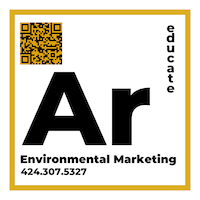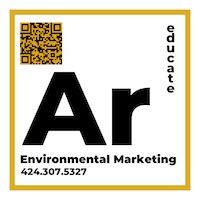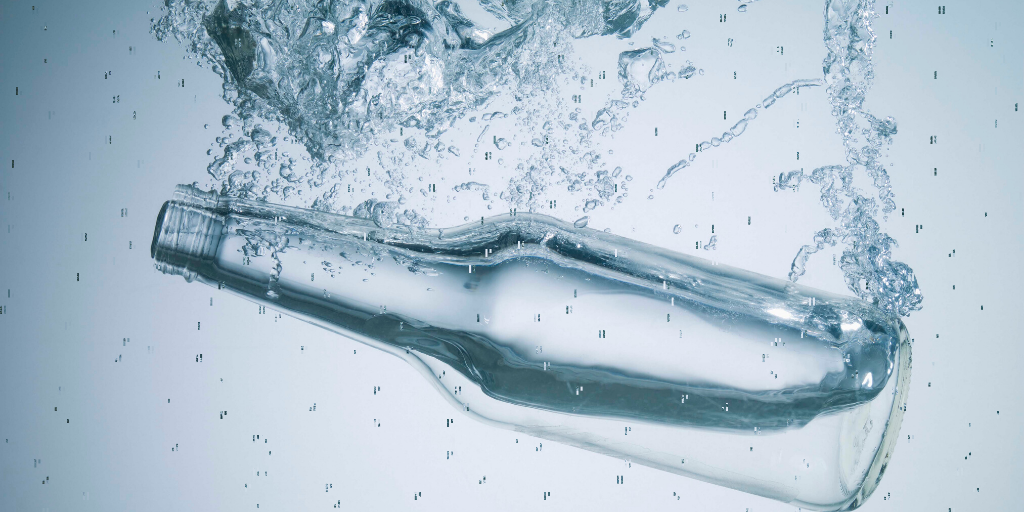There are two types of people – those who prepare for emergencies, and those who don’t. Which one are you? Preparing for emergencies comes down to being psychologically resilient enough to feel the threat of a disaster before it strikes, to prepare for it. Preparation helps reduce stress and build confidence in emergencies. Action beforehand is required; here are the answers to some of the most important questions about emergency water storage.
What is a water emergency?
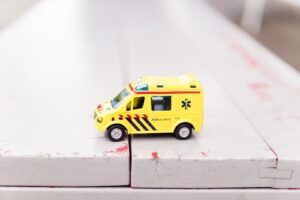
For people who live in areas of the world with water supply, you can become reliant on water, always coming out of the tap. In an emergency or natural disaster where your water supply might be shut off for days or even weeks, being prepared can be the difference between hydration and dehydration. Since the average person can only survive without water for roughly three days, it’s good to know if water shuts off, you can find some emergency reservoirs in your hot water tank, pipes, and ice cubes. To avoid having to use these last resort resources, you can prepare by planning for water storage for up to a few weeks in case of an emergency.
How much water should I have for an emergency?
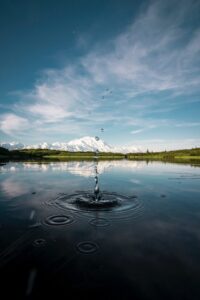
An active person requires a minimum of a ½ – 1 gallon of water every day. You will want to have two weeks of drinking water prepared for each family member in your household.
If you want to prepare your kit, you will want to store about 14 gallons of water for every person and pet in your household. If you have three people in your home, you will want to save 42 gallons of water. Drinking water should be stored in a cool, dry place. Consider storing just above the amount needed, in case the emergency lasts longer than two weeks. If you find yourself running out of the water, reduce the intake of salty foods, reduce activity, and conserve the water you have.
For hygiene and food preparation, you will want to store the same about ½ gallon her person per day. That is the same amount necessary for daily usage beyond hydration.
How long can I store water for an emergency?
When it comes to bottled water, you’ll find an expiration date somewhere on the bottle. Why is that? Water doesn’t expire. As a consumable food product, FDA regulations require an expiration date to be printed on the bottle; it’s just one of many printed elements required to identify the bottling date, plant, and other critical information about what has been bottled.
Water doesn’t expire, single-use plastic bottles made of PET (polyethylene) do. The 1-year marker is typically when chemicals begin leaching into the water of the PET bottle, as they are very porous and tend to absorb whatever is in the surrounding area. When drinking water from glass or reusable aluminum bottles, this recommendation can be stretched further.
Does emergency water expire?

Water does not expire. How it is stored and what it is stored in will determine the flavor and safety of the water. However, you can still drink water that has been stored for over a year.
How do you prepare water for emergency storage?
Depending on the space you have, you can:
Fill your non-plastic refillable bottles with screw-on tops. The steps for storing water in your bottles are:
- Sanitize the bottle
- Fill bottles with water from your filtered faucet or tap
- Store bottle in a cool, dry, and dark place
- Replace every six months with the same steps
Some of the top filtration systems for this step are:
Big Berkey Gravity-Fed Water Filter is a filtration system that comes with fluoride and arsenic filters and gives you water with fewer metals and chemicals. Like its road trip sidekick, the Travel Berkey comes with a stainless steel reusable bottle.
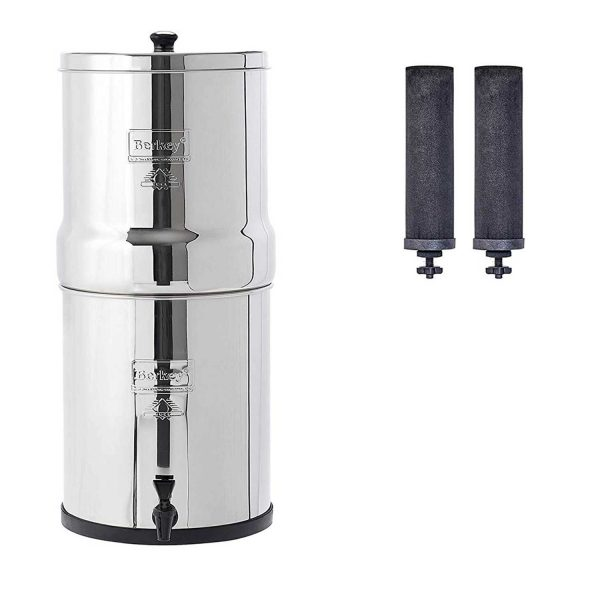
Home Master Artesian Reverse Osmosis System is an under the sink water filter, which removes more than 99% of most dangerous contaminants in the water, including heavy metals, herbicides, pesticides, chlorine, and other chemicals. This reverse osmosis filtration system is known to:
- Add healthy minerals back after filtration
- Lower water waste that is common to R.O. systems
- Easy to maintain
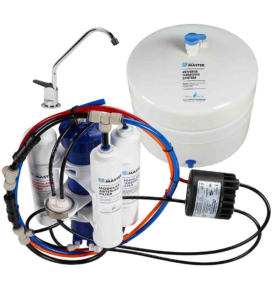
Mitsubishi Cleansui Micro Filtration Pitcher is some of our team’s favorite water pitchers. Cleansui’s micro-filtration system completely removes solid lead, bacteria, algae, fungi, micro-organisms, cysts, parasites, rust, and other particles from tap water. What makes Cleansui so unique is the ability to capture microplastics from entering the water you drink.
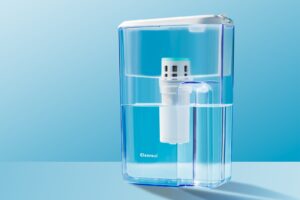
The PUR 18-Cup Dispenser with Filter is a widely available filter that removes 99% of lead, 96% mercury, and 92% of certain pesticides, and holds up to 40 gallons of water. You are guaranteed great tasting purified water at an affordable price.
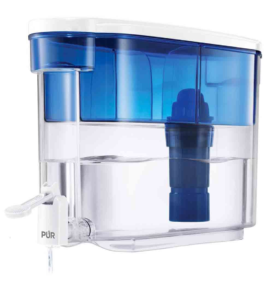
Travel Berkey Water Filter is the best portable filter for your road trips. It comes with a stainless steel reusable bottle to pour your clean filtered water—more time for sightseeing and less time stopping to buy single-use bottles along the way.
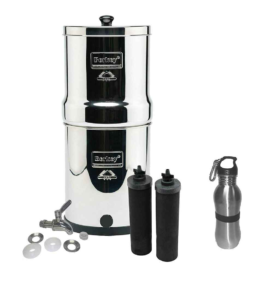
Now that your water is filtered, what will you store it in? Let’s take a look at some large and smaller options depending on your storage space.
Invest in food-grade barrels to prepare and store water.
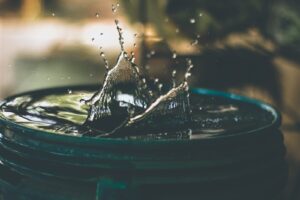
If you are storing water for an extended period, you will want to save ½ to 1 full gallon of water per person for every day. This is also true if you are preparing water barrels. Food grade water barrels typically come in 55 gallons. This equates to 2 gallons of water per day for two people that will last two weeks.
The most basic steps for preparing water in a barrel include:
- Choosing a high-quality food-grade barrel
- Disinfect the barrel with a thorough cleaning
- Fill up the drum with potable water
- Store barrel in a cool, dark location away from the sun and slightly raised off the ground
- When ready to consume, treat the water with disinfectants like water tablets, iodine, or bleach with measurements recommended by the EPA.
How often should I replace my emergency water?
The CDC (Center for Diseases Control) recommends replacing non-store bought water every six months. The recommendation is to observe the expiration date and replace water accordingly, which is typically one year for bottled water.
What is the best emergency water bottle?
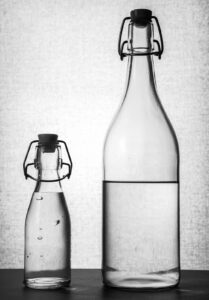
When it comes to storing bottled water for an emergency, ditch plastic. Plastic-free bottled water companies are coming out and offering better solutions for long-term emergency storage. The best choices are bottles that you can reuse over and over again. The downfalls of storing single-use plastic bottled water are that the bottle quickly leaches chemicals into the water and that you’d be contributing to more plastic pollution in the world.
Here are some of the best plastic-free bottled water options for emergency storage:
Ever & Ever brings you still water and sparkling water in a 100% aluminum bottle. You can store these bottles and reuse them as much as you want, then recycle them.
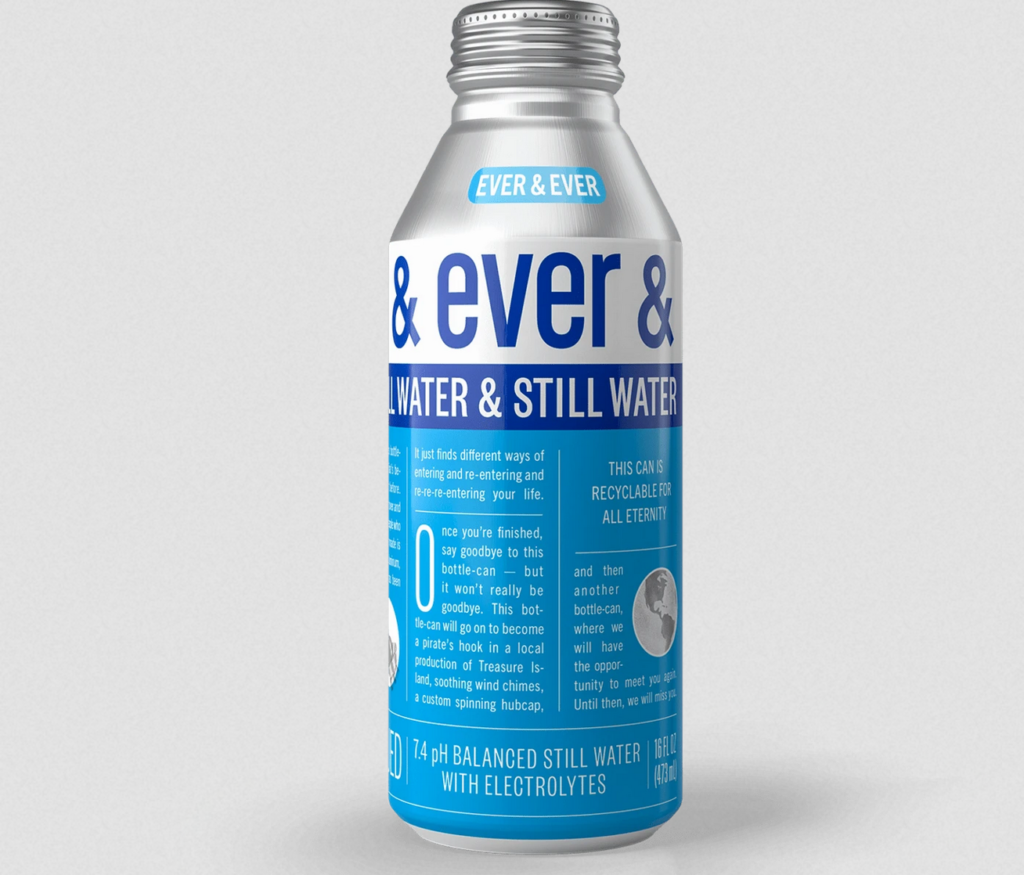
RainForest Water brings a much-needed plastic bottled water alternative to Costa Rica. The 100% aluminum and glass bottled water offers a touch of paradise and automatic participation points in tree planting. This is a shot out to our resident Tico, Christina, the Environmental Content Strategist here at A.R. Marketing House. And the bottles are gorgeous!
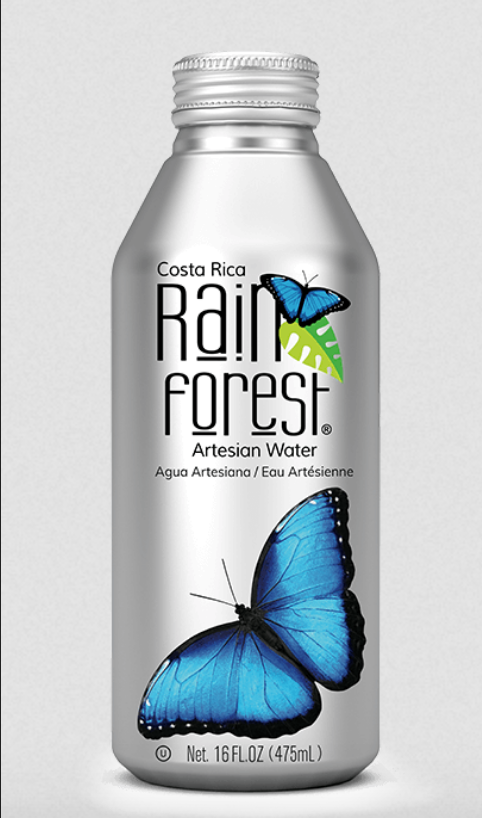
Proud Source Water is another plastic-free bottled water industry disruptor. This fully aluminum bottle would be a great addition to any emergency storage since you can refill the bottle safely after use.
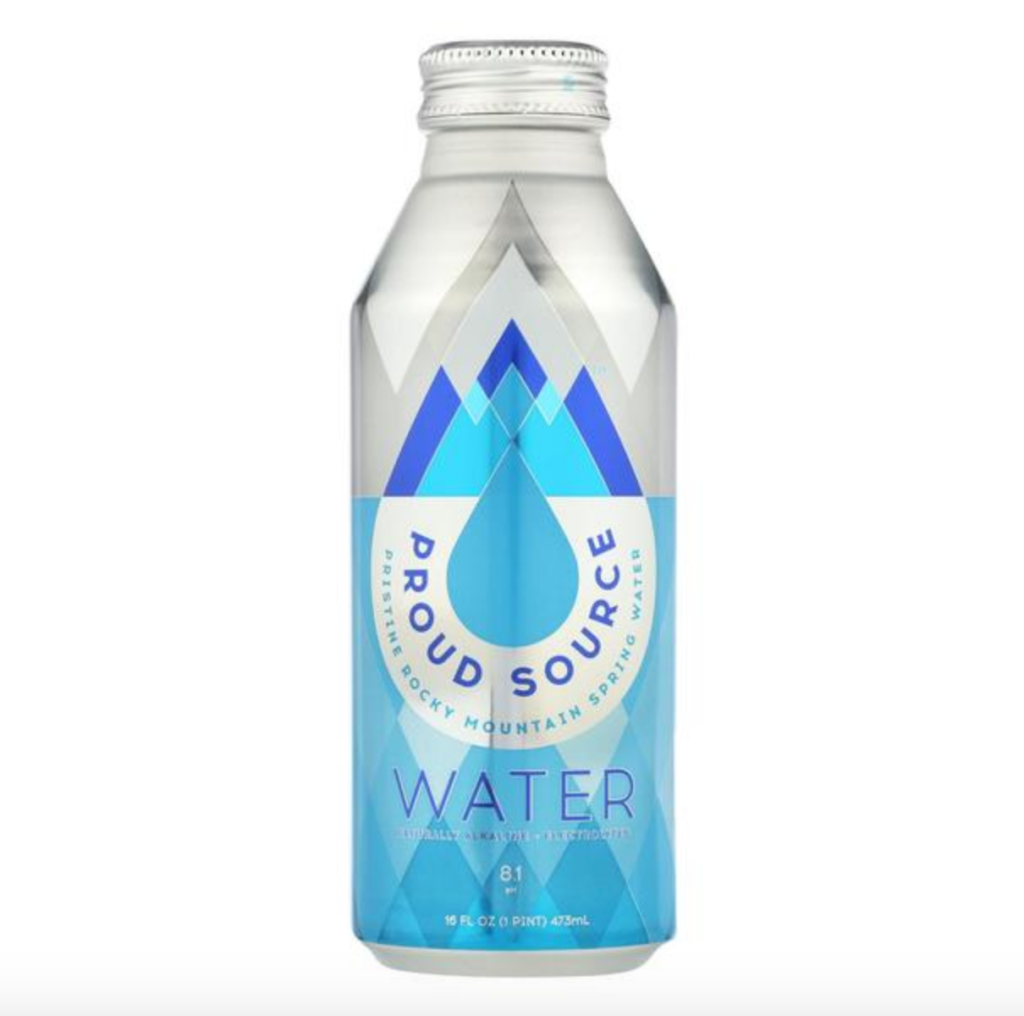
Woman-owned, Open Water, formerly known as Green Sheep Water, is a reliable, safe choice for drinking, refilling, and storing water. These fully aluminum bottles are refillable bottles as well as 100% recyclable.
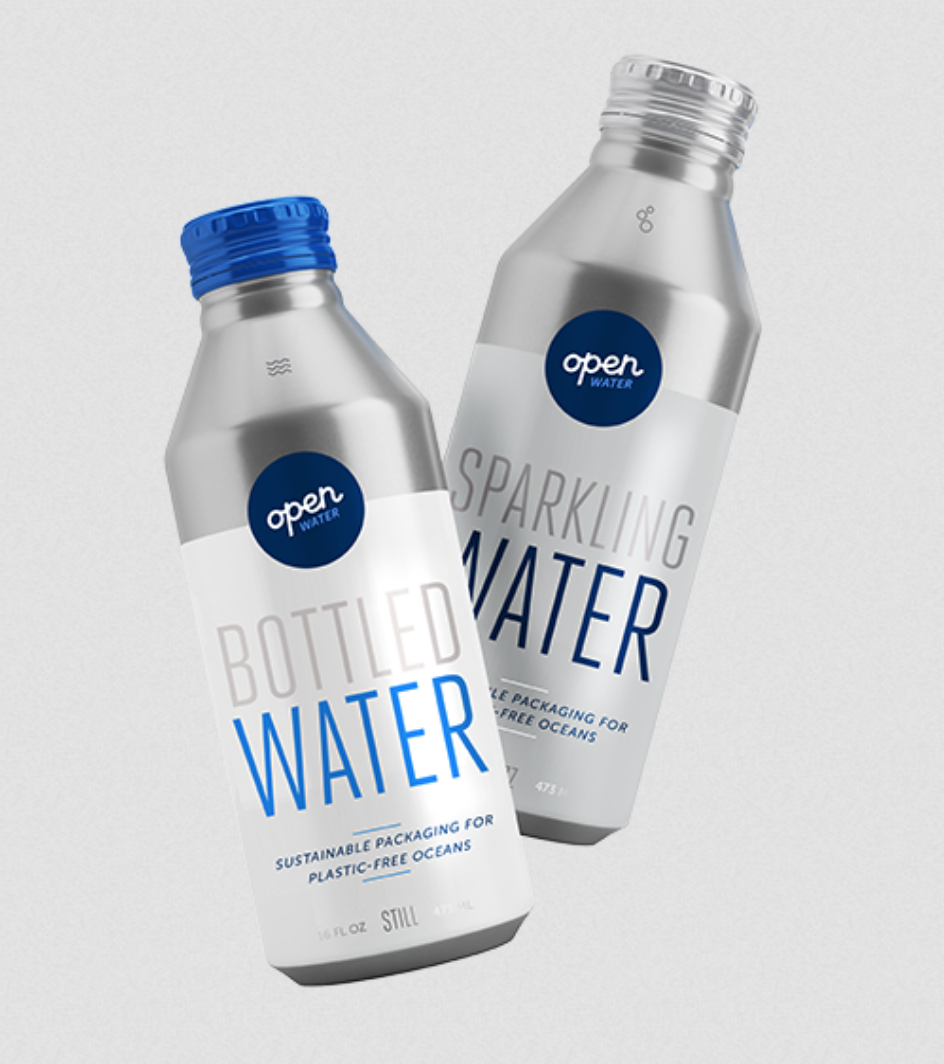
Prepare your water emergency water kit
Time to get started! Being prepared for emergencies is an empowering feeling. Knowing your family will have the clean water they need if an emergency strikes will help everyone sleep better at night. There are so many alternatives to single-use plastic bottled water for safe water storage. Seek better, healthier water filtration systems and plastic-free bottled water for an emergency, and everyday hydration. Be safe, and stay healthy.

Resources
https://www.cdc.gov/healthywater/emergency/drinking/creating-storing-emergency-water-supply.html
https://www.epa.gov/ground-water-and-drinking-water/emergency-disinfection-drinking-water
https://extension.psu.edu/how-to-store-water-for-drinking-or-cooking
https://www.medicalnewstoday.com/articles/325174
https://www.ccwater.com/173/Emergency-Preparedness
https://www.livescience.com/32636-why-do-bottles-of-water-have-expiration-dates-.html
